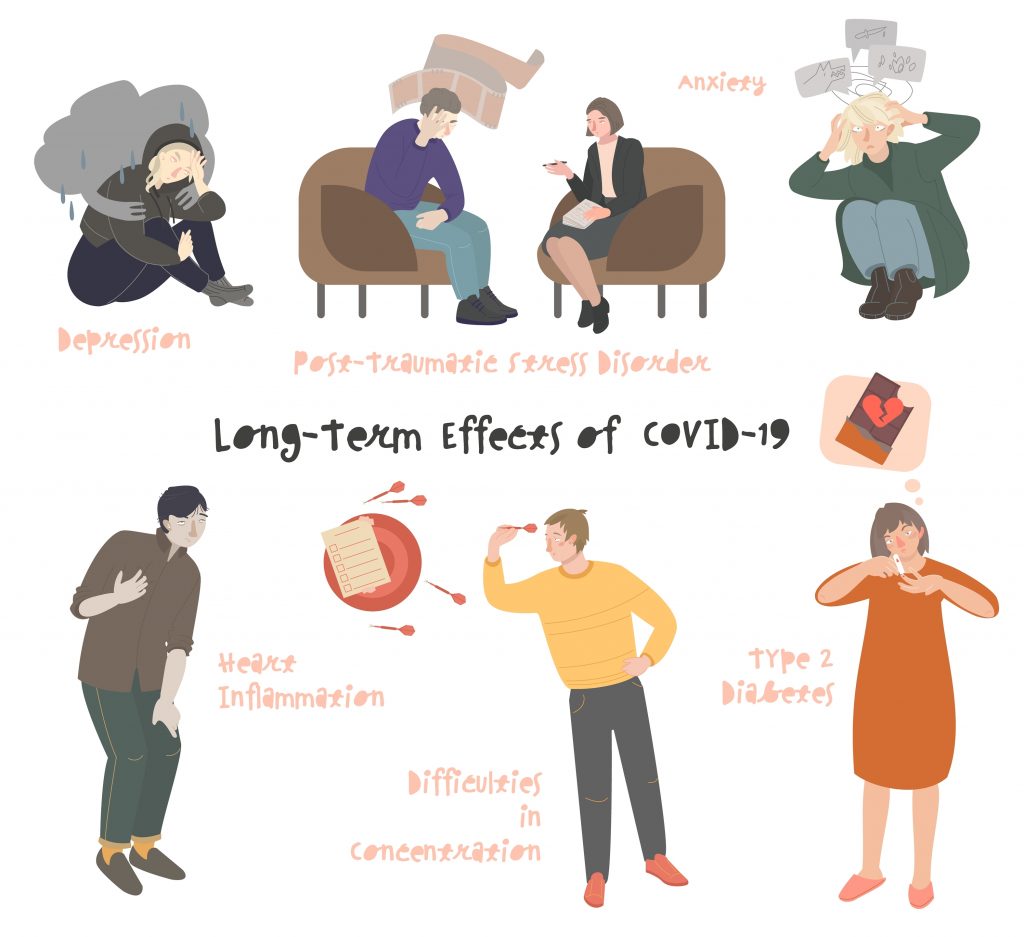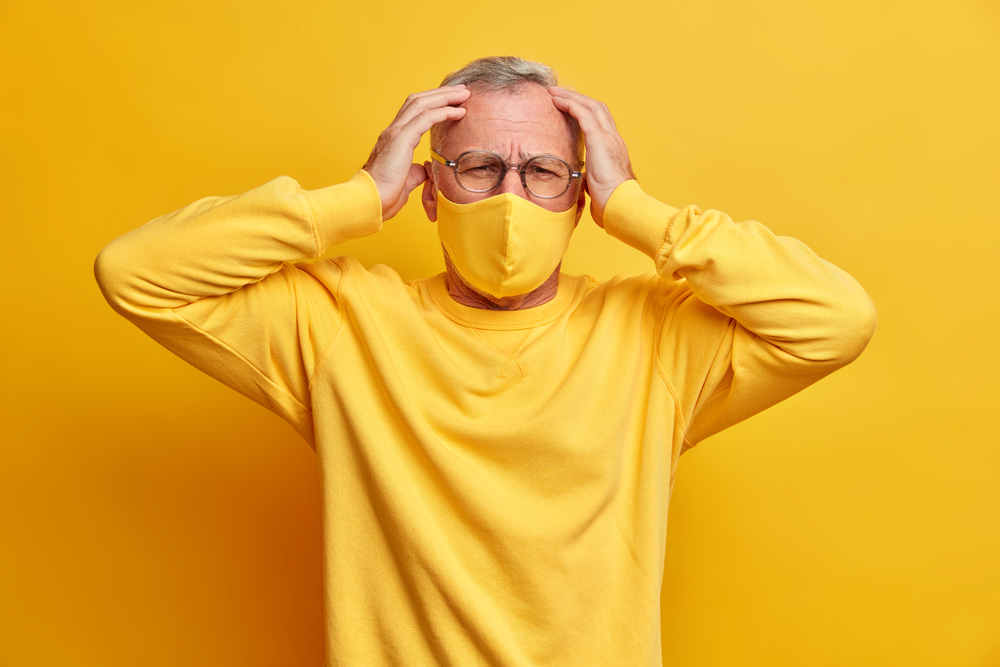SARS-CoV-2 or Covid-19, the tiny but deadly virus that brought the entire world to its knees, spared no age, race or human whether healthy or immunocompromised, and no amount of money, power or clout could help you escape the jaws of Covid-19. If you’ve been unlucky enough to contract Covid-19 but lucky enough to recover from it in one piece, you must definitely have been on the wing of an angel.
What is Covid-19?
The virus is part of the coronavirus family, the virus on entering your body, makes contact with the mucous membranes that line your nose, mouth, and eyes latching onto healthy cells and multiplying at an alarming rate infecting nearby cells, and spreading throughout your body. Throughout its existence, Covid-19 targets mainly the respiratory system in its earliest phase, so one experiences cold and flu like symptoms of a sore throat, blocked and stuffy nose, extreme weakness, headaches and an unrelenting cough, however through mutating and metamorphosing into variants like “Delta” and “Omicron” it has become crystal clear that Covid-19 isn’t your ordinary flu. With more than two years of vigorous research, genome testing and data collection it has come to our attention that many who have recovered from Covid-19 are developing other medical problems down the line. These markers are not only related to the respiratory system but also the body’s other major organs and systems like the heart, liver, kidneys and the neurological system.
What is Long Covid?
Long Covid makes it to the top of the list when it comes to dreading being a Covid-19 survivor and the concept of ‘Long Covid’ depends on the severity of the disease contracted by an individual and how your immune system fights it. If you have recovered from Covid-19 (fourteen days is the set norm) but are still experiencing post-Covid-19 symptoms; (The symptoms range from hair loss, heart disease, brain fog, nerve disorders, persistent cough, altered sense of smell and taste, sleep and mood alterations, fatigue, to mention the most common of all.) chances are you have Long Covid. Signs and symptoms can be unpredictable, life-threatening and can even persist for a long time after recovery, which can range from a few weeks or many months after being diagnosed with Covid-19.
Doctors and scientists are still working on figuring out the enigma of Long Covid. Research and studies being continuously conducted in an effort to understand how it affects people, time spans of symptoms, resolving infections timely and permanent damage caused to the organic body. Any patient or person who develops post COVID-19 conditions should seek medical care immediately. The care recommended and administered should be multifaceted by including your family physician, specialised professionals and in some cases even psychosocial and mental health professionals.
NOTE: Findings are that long-term effects of Covid-19 appear to be more widespread than previously thought. We now know that the Covid-19 virus affects the clotting system, increasing the risk of Thrombosis.

Post Covid-19 symptoms include —
Lingering fatigue and weakness, body aches, headaches, shortness of breath or difficulty breathing, lapses in memory and brain fog, poor concentration, sleep difficulty and related issues, low moods, muscular pain, racing heartbeat, post Covid-19 bronchitis, dry cough and worsening of pre-existing comorbidities.
Covid-19 and your lungs —
We all know that Covid-19 is predominantly a respiratory disease, one that targets your respiratory tract and lungs, that’s why some of the most common symptoms caused are a spectrum of breathing problems from mild to critical and are respiratory related like trouble breathing, coughing, sore throat, loss of smell and taste.
What does the virus do to your lungs?
Think of your respiratory tract as an inverted tree. The trunk of the tree is your windpipe which splinters into smaller branches in your lung. At the end of each branch are tiny air sacs through which oxygen goes into your blood and carbon dioxide is expelled. The new coronavirus infects the upper or lower part of your respiratory tract and travels down your airways. The lining of your tract gets irritated and inflamed and in some cases the virus even reaches your air sacs, inflaming your lungs, damaging the cells and tissue in your lungs and can finally even lead to pneumonia. Older adults and people who have other health conditions like cancer, heart disease, diabetes may develop more serious symptoms.

COVID-19 and your heart —
While you think you may have escaped the shackles of Covid-19, it’s still important to watch out for long-term complications, especially when it comes to your heart. People with acute cases of coronavirus disease are at risk of type 2 heart attacks, but it is less common in those who are unscathed Covid-19 warriors.
– Type 2 heart attacks are more common with Covid-19. This heart attack is the cause of increased stress on the heart, such as a rapid heartbeat, low blood oxygen levels or anaemia caused by inadequate oxygen to the heart muscle.
– Covid-19 can also affect the strength of the heart, especially after severe cases of Covid-19. This is more pronounced in patients with heart disease.
– Heart failure after Covid-19 is quite rare but if you do experience shortness of breath, tightness in your chest or swelling in your lower extremities you should alert your doctor who may recommend a cardiac evaluation. A blood tests showing elevated troponin levels with an abnormal EKG and chest pain can increase your chances of mortality, elevated troponin levels are a sign of damaged heart tissue which can be the result of a heart attack. However, this is not very common after Covid-19. Research indicates that there is still a lot to learn about long lasting heart effects on people who have had Covid-19.
Covid-19 and your nerves —
If 2020 highlighted anything for us it’s that the SARS-CoV-2 virus can affect the Olfactory Nerve, causing anosmia colloquially known as the loss of smell. Long Covid sufferers that have survived Covid-19 also have a chance of developing Peripheral Neuropathy, a condition that causes damage to the nerves connecting the brain and spinal cord, approximately ninety days post recovery. The peripheral nervous system plays a vital role in sending information from the brain and spinal cord to the rest of your body. In the case of Peripheral Neuropathy, the peripheral nerves located on the outer side of the brain and spinal cord get damaged, causing numbness, weakness and pain usually in extremities like the hands and feet, and some cases of digestion, urination and circulation issues. When the virus increases in count after recovery from Covid-19, and the immune system cannot keep up with the attack, it triggers and accelerates inflammation and pre-existing autoimmune conditions, connecting the effects of post Covid-19 and your nerves.
Covid-19 and older adults —
While the Omicron variant has been termed as relatively milder than previous variants like Delta, some of the Long Covid symptoms are worrisome, especially when they last for weeks or longer. This has been observed among all age groups especially among older people and people with lower immunity levels.
Research has shown that numerous older adults have been diagnosed with conditions which are the consequence of Covid-19 and require medical treatment. Covid-19 is seen to affect vital organs in older adults and cause symptoms like fatigue, extreme weakness, brain fog, cardiac issues, shortness of breath or breathlessness, sleeping difficulties, body aches, testicular pain, erectile dysfunction, hypogonadism among males, hair loss etc.
Be aware and make the connection, seek medical advice timely to avoid further serious complications.

Covid-19, its variants and post Covid in a nutshell —
People with comorbidities like diabetes, hypertension, cardiac diseases, chronic kidney disease, elderly, cancer patients, patients on immunosuppressant medication are prone to getting infected severely with Covid-19 or its variants. If you are among the many Covid-19 warriors a sigh of relief is in place as, in spite of an endless increase in the range of Long Covid side-effects, there is confidence among the medical community that treatments will be available to combat all of these problems.
Being a Covid-19 warrior and a recent heart disease survivor, I can tell you that it was not fun at all.
Be very mindful of your health and even though all restrictions have been picked up world-wide;
Be vigilant!
Keep masking up!
Stay selfishly safe!




